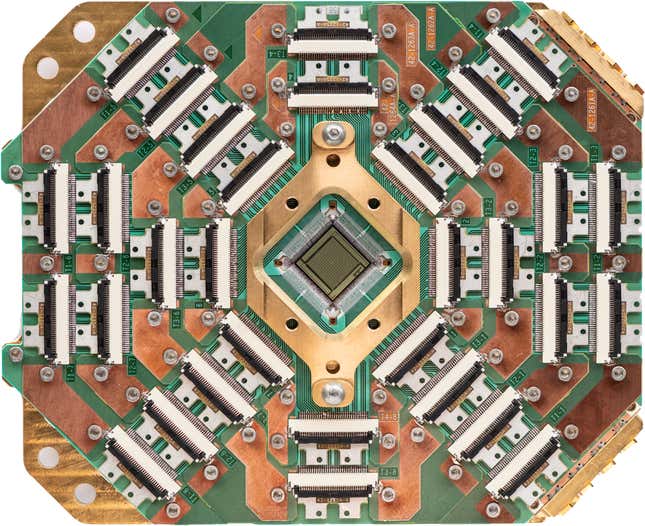
In theory, quantum computers should be faster at solving many problems compared to classical computers. But because their components are extremely delicate, existing quantum computers are still rudimentary and error-prone, and academic and industry researchers have yet to demonstrate a profitable use for them. In pursuit of commercial applications, companies have built incrementally more complex quantum devices. Today, Canada-based company D-Wave announced the latest in this lineage of machines: Its fifth-generation quantum computer, named Advantage, which is accessible to customers via the cloud.
D-Wave tailored this upgrade based on recommendations from its users, which include companies such as Volkswagen, drug design company Menten AI, and Canadian grocery chain Save-On-Foods. “We’ve gotten about 10 years of user and customer feedback on what works and what doesn’t,” said Mark Johnson, vice president of quantum products at D-Wave and a physicist by training.
Through these partnerships, D-Wave is hunting for ways its devices could benefit businesses. Like other existing quantum computers, D-Wave devices can only solve specific types of problems. D-Wave’s machines are particularly designed to solve optimization problems quickly. For example, Volkswagen has found that D-Wave’s quantum device can help it minimize waste when switching between colors while painting its cars, according to Johnson.
D-Wave’s new device consists of 5,000 tiny circuits made of niobium on a chip, cryogenically cooled to near absolute zero. Each circuit constitutes a qubit, producing a magnetic field that can point in one of two directions to represent the value 1 or 0, like a classical bit. But because this magnetic field behaves quantum mechanically, the qubit can represent values that are a superposition of both 1 and 0. To do math, D-Wave’s computer manipulates the qubits’ magnetic field according to an algorithm. Advantage contains 3,000 more qubits than D-Wave’s previous model, the 2000Q released in 2017. The more qubits a device has, the more variables it can represent, allowing it to tackle more complicated problems, said Johnson. Customers can access the computer by logging onto it remotely through D-Wave’s cloud service, Leap.
Each qubit is connected to 15 other qubits, an increase from six in previous D-Wave devices. With better connected qubits, the computer can solve problems more cleverly to reduce the likelihood of errors, according to quantum computing researcher Nicholas Chancellor of Durham University, who has used D-Wave machines in the past. “I think increasing this connectivity is an incredibly important step,” said Chancellor.
Among quantum computers, D-Wave’s devices, known as quantum annealers, compute in a distinctive way. Most companies, like Google and IBM, have what’s known as a gate-model quantum computer. A gate-model quantum computer executes an algorithm by actively modifying each qubit step by step, like lines of code in a traditional computer program. By contrast, an annealer executes an algorithm by placing qubits in an engineered environment, cooling down the temperature, and letting the circuits change their value passively. “The difference is whether you chunk up the protocol into discrete steps, or whether you run something over the entire device all at the same time,” said Chancellor.

While it’s tempting to pit the two types of computers against each other, it’s tricky to compare their performances. For example, even comparing the number of qubits across different devices is simplistic and misleading. At 5,000 qubits, D-Wave’s Advantage would seem to outstrip devices like Google’s and IBM’s, whose flagship devices have fewer than 100 qubits. But because the computers function so differently, it’s like comparing apples and oranges. “Having more qubits is not everything,” said quantum computing researcher Juani Bermejo-Vega of the University of Granada. “Control over those qubits also matters.”
Experts, even within D-Wave, do not fully understand the scientific mechanisms behind how D-Wave’s qubits arrive at an answer, according to Bermejo-Vega. Compared to other quantum mechanical phenomena, its qubits function at a relatively warm temperature that is difficult to study. “It’s hard to make sense of their device,” she said.
Consequently, it’s unclear whether quantum annealers can truly offer the exponential speedup that theory predicts of quantum computers, what experts refer to as “quantum advantage.”
“It’s still an open question,” said quantum computing researcher William Oliver of MIT. But he points out that a lack of quantum advantage does not mean a lack of commercial value. “Even if a quantum annealer is just another classical computer, maybe it’s a classical computer that’s better,” said Oliver. D-Wave has also developed hybrid algorithms that pair its quantum annealer with a classical computer, in search of near-term practical value.
D-Wave’s hardware engineering could translate to improvements in gate-model quantum computing hardware, said Oliver. Advances in controlling thousands of cryogenically cooled components may help other researchers scale up their gate-model superconducting qubits to larger systems.
D-Wave isn’t prioritizing quantum advantage, according to Johnson. Instead, they are focusing on what they call “customer advantage,” he said. “Can we provide a solution to folks that’s easier to implement, faster to implement, less expensive to implement, or some combination thereof, compared to what they’re doing now?” said Johnson.
Like the rest of the industry, D-Wave’s long-term goal is to build a universal quantum computer capable of solving many types of problems, said Johnson. But this task is likely to take a decade or more. Along the marathon journey toward its dream machine, D-Wave is looking for niche uses for its quantum computers.